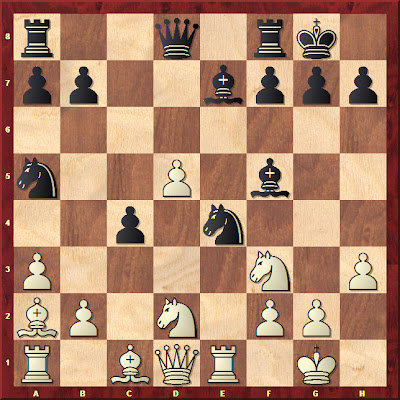 |
| Raphael Persitz, Davar, 16.4.1954 |
Shortly after the end of the international tournament in Hastings... the winner, C. H. O'D. Alexander, fell pray to the young Israeli master Raphael Persitz. Two weeks later Persitz defeated one of the top English masters, Jonathan Penrose, in the following game...the interesting thing here is that neither of these games are mentioned in the "standard" databases (e.g., Chessbase 9, or the Interent database http://www.chessgames.com/). (Edited to add: the Persitz-Penrose game is found Chessbase's 11 Mega Database, see comments). This, of course, is no proof of these games being "unknown": all it means is that the games were played in smaller (non-international) events.
In Davar a week later (23.4.54) we read:
Persitz's victory over Alexander had, as expected, created a stir in the English press. Alexander's victory over Botvinnik in the 1946 radio match gave him a reputation of a great player, but his victory in Hastings, and especially his sensational defeat of Bronstein, were the apex of his career and got him worldwide press. No doubt Persitz chose the right moment. At the request of many of our readers we are publishing the game.It is, indeed, an intersting game -- a nice example of mutual "pawn storms".
Persitz, Raphael - Penrose, Jonathan [C29]
(Event?)
Source: Davar, 16.4.1954
1.e4 e5 2.Nc3 Nf6 3.f4 d5 4.fxe5 Nxe4 5.d3 Nxc3 6.bxc3 Be7 7.Nf3 0–0 8.d4 Bf5? The source of Black's future troubles. 9.Bd3! Bxd3 10.Qxd3 c5 11.0–0 Nc6 12.Rb1! The purpose of this move will be made clear in five more moves. 12...b6 13.Be3 cxd4 Looking for counterplay on the c-file 14.cxd4 Rc8 15.Qf5! Kh8 The "logical" 15...f6? is impossible because of 16.Qe6+ Kh8 17.Rb5 16.Rbd1 Nb4 17.Ng5! Every move counts here; no point protecting the "cannon fodder" pawns. 17...Bxg5 18.Bxg5 Qe8 19.Rf3! Rc6! 19...Qe6? 20.Qxe6 fxe6 21.Rxf8+ Rxf8 22.Be7 wins a piece. 20.c3 Na6 forced. 21.Rdf1! again preventing Qe6.
 |
22.Bf6! The final blow. 22...Qc8 23.Qh5 gxf6 desperation in a desperate position. 24.Rh3 Qxh3 25.Qxh3 fxe5 26.dxe5 Re6 27.Rf5 h6 28.Rf6! Rxf6 Forced. 29.exf6 Kh7 30.Qf5+ Kh8 31.Qf4 1–0
Alexander, C. H. O'D - Persitz, Raphael
Glochestershire - Oxfordshire match (Scotch game)
Swindon, 27.3.54
Source: Davar 23.4.1954
1.e4 e5 2.Nf3 Nc6 3.Nc3 Nf6 4.d4 Bb4 5.d5 Ne7 6.Nxe5 0–0 7.Qd4! Bxc3+ 8.bxc3 Re8 9.Bg5 Nf5! 10.exf5 d6 11.f4 dxe5 12.fxe5 Qxd5 13.0–0–0! Qxd4 14.cxd4 Ne4 15.Bh4 Nc3 16.Rd3 Nxa2+ 17.Kb2 Nb4 18.Rf3 a5 19.c3 Nd5 20.Bc4 c6 21.g4 b5 22.Bd3 Bd7 23.g5 c5
 |
24.Rhf1 a4 25.Be4 Bc6 26.g6 a3+
 |
27.Ka1 cxd4 28.gxf7+ Kxf7 29.e6+ Kg8 30.cxd4 Ra4 31.Rg1 Rxd4 32.f6 Rxe4 33.f7+ Kf8 34.fxe8Q+ Kxe8 35.Bf2 b4 36.Bc5 Rxe6 37.Rf8+ Kd7 38.Rxg7+ Ne7 39.Bxb4 Bd5 40.Rff7 1–0










